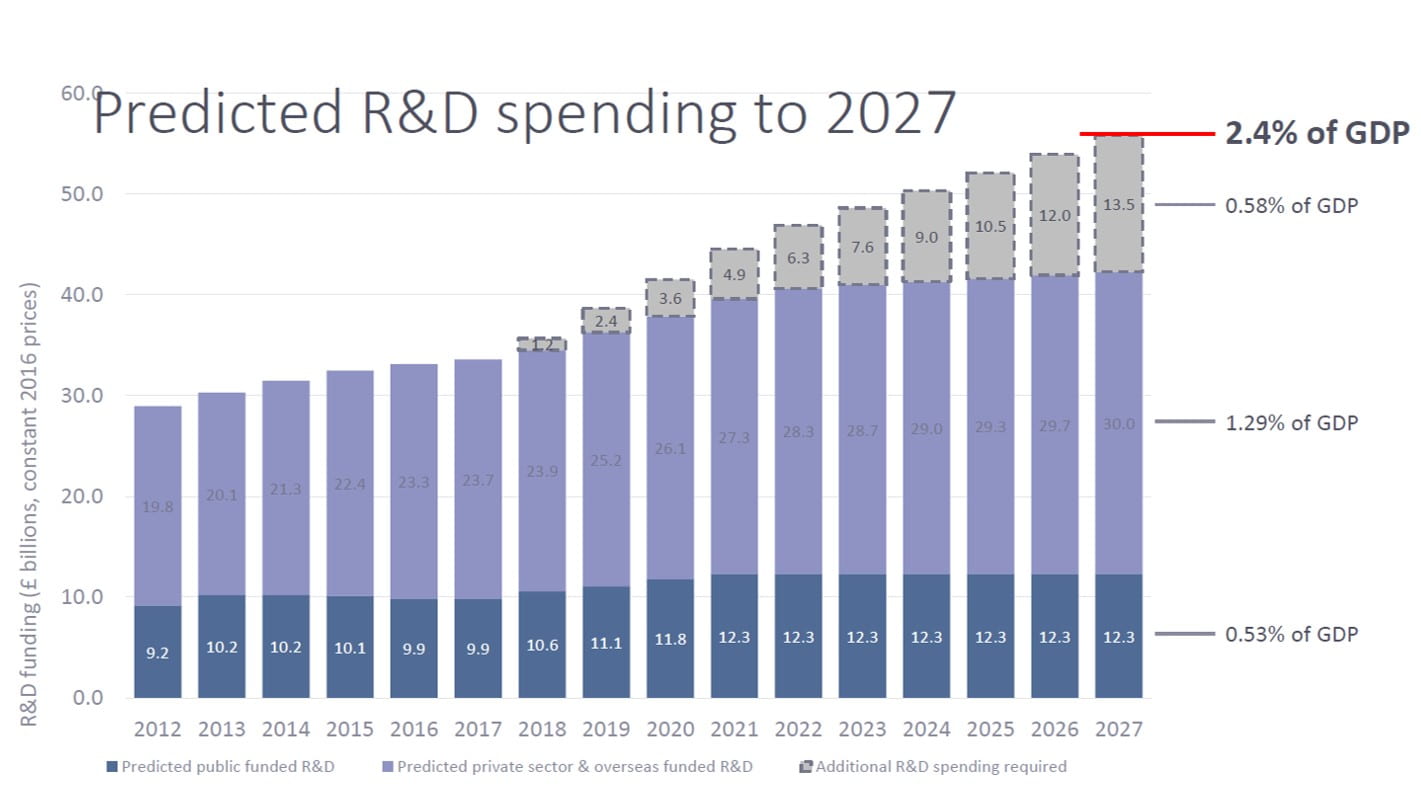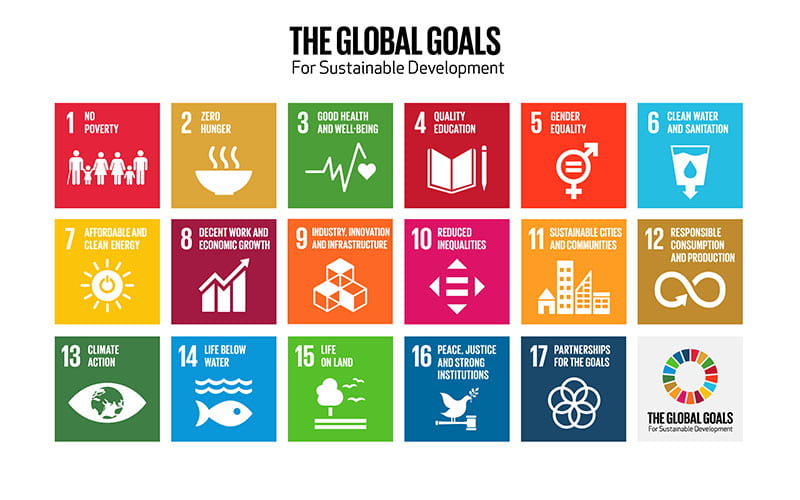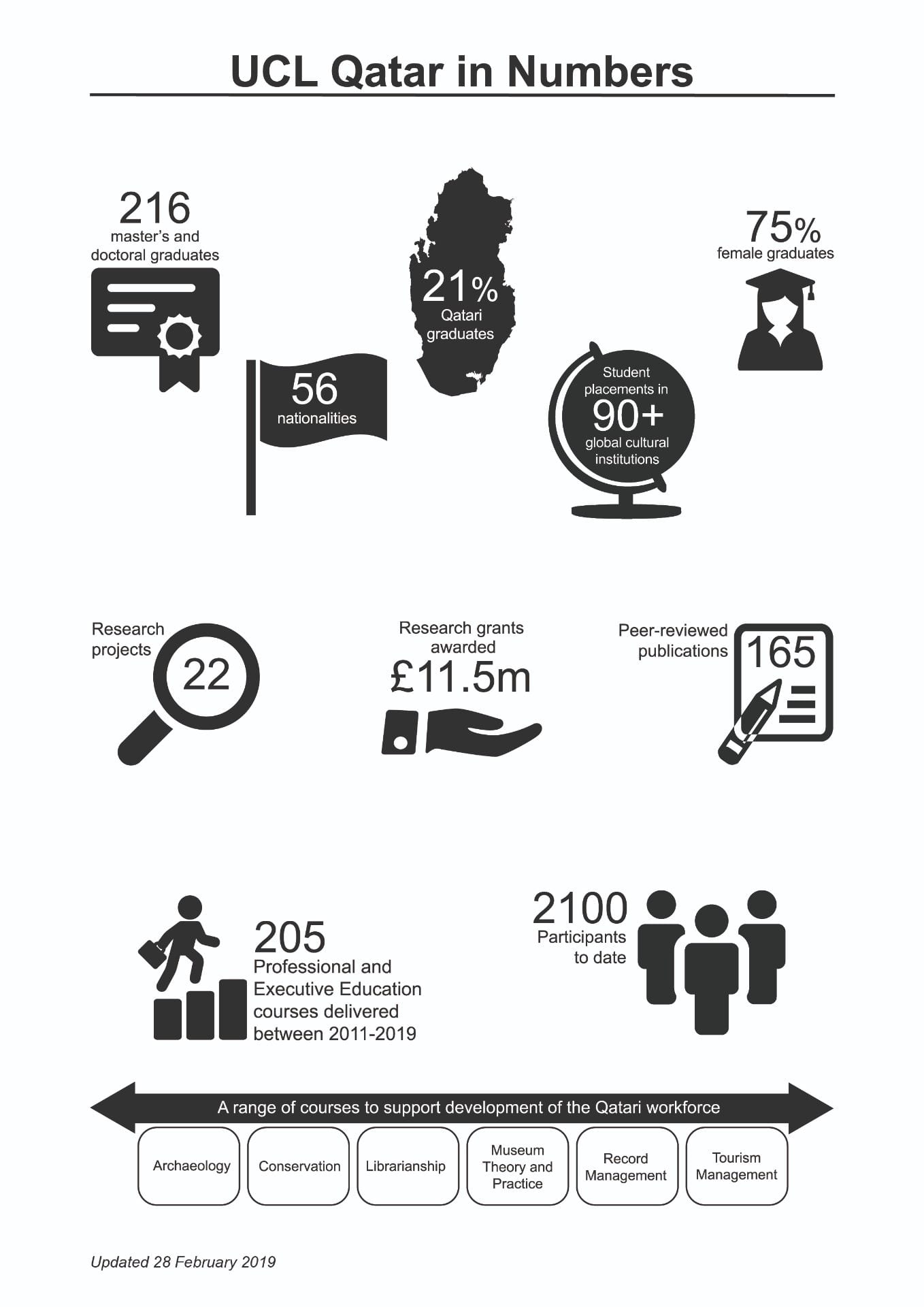The increasing importance of collaboration between universities and external partners
By ucypcac, on 4 June 2019
Perhaps one of the biggest challenges that leaders and policy makers face today is to achieve sustainable socioeconomic development in the coming decades. By ‘sustainable,’ we mean growth that brings benefits and opportunities equally across all segments of society and does not come at the cost of jeopardising the environment.
The recent climate protests in London – and before that the global ‘occupy’ movement – have shown the depth of feeling around these issues.
Yet there needn’t be a dichotomy between economic growth and societal and environmental preservation. Leading economists, such as last year’s Nobel laureates William Nordhaus and Paul Romer, have shown that both can be achieved and even become mutually dependent.
This will not happen with a ‘business as usual’ approach though. It will require a significant increase in research and development (R&D) – with universities, industry, third sector and government working together to solve complex social, environmental and technological challenges.
UCL Innovation & Enterprise has responded to this challenge through the creation of the Business & Innovation Partnerships (BIP) team, which helps academics collaborate with some of the world’s leading companies, as well SMEs, NGOs and charities.
Our BIP team is made up of specialists with academic and business backgrounds who understand both the research and economic landscapes – and crucially how to marry to the two successfully. The ultimate aim is to forge multifaceted, long-lasting partnerships, which can begin to address some of the complex societal and technological challenges of our times.
One initiative that the BIP team has been involved with, that exemplifies the sort of sustainable growth we might aim for in the future, is the Global Disability Innovation (GDI) Hub.
Assistive technology for the benefit of all
 Based at Here East, the GDI Hub is helping to accelerate the provision of assistive technologies to improve the lives of people with disabilities. It is formed of a research centre and a non-profit, community interest company (CIC). UCL Innovation & Enterprise helped to establish the CIC as well providing knowledge exchange funding and business advice – all of which helped ready the GDI for engagement with government and other funding partners.
Based at Here East, the GDI Hub is helping to accelerate the provision of assistive technologies to improve the lives of people with disabilities. It is formed of a research centre and a non-profit, community interest company (CIC). UCL Innovation & Enterprise helped to establish the CIC as well providing knowledge exchange funding and business advice – all of which helped ready the GDI for engagement with government and other funding partners.
In April, the GDI hub secured a £19.8 million grant from the UK Department for International Development (DFID) to test new approaches to assistive products and service design, as well as the markets which support their provision globally. Crucially, the DFID funding will be 100% matched by the private sector, country governments, academic institutions, NGOs and other partners.
The GDI has a major presence in Europe, Asia and Africa – with some particularly exciting projects in Kenya. While Kenya has a burgeoning tech sector, it risks leaving people with disabilities behind. Now a project called Motivation is aiming to develop the next generation of wheelchairs there.
Clearly, improving the lives of all people with disabilities is something we as a society should absolutely be striving to achieve under any circumstances. At the same time, this project has the added benefit of effectively creating new market sectors in many developing nations – stimulating local economies and also increasing overall productivity.
Green shoots of growth
 In the UK, the goal of creating sustainable and equitable economic growth is laid out in the Industrial Strategy, first published in 2017. It highlights four key Grand Challenges – Artificial Intelligence and data; Ageing society; Clean growth; and the Future of mobility – through which to focus R&D efforts.
In the UK, the goal of creating sustainable and equitable economic growth is laid out in the Industrial Strategy, first published in 2017. It highlights four key Grand Challenges – Artificial Intelligence and data; Ageing society; Clean growth; and the Future of mobility – through which to focus R&D efforts.
There are promising signs that the Industrial Strategy is stimulating activity in these areas. The Department for Business, Energy and Industrial Strategy (BEIS) recently published an online interactive map, plotting companies and projects that are answering the call of the Grand Challenges – featuring several from the UCL community.
For example, covering both ‘Clean growth’ and ‘Future mobility,’ UCL spinout Bramble Energy is bringing hydrogen fuel cell technology to the mainstream, ushering in a new era of truly sustainable power. Bramble’s use of printed circuit board (PCB) technology to form the structural parts of the fuel cell is driving down costs and leveraging existing manufacturing infrastructure for PCBs. Bramble is developing products and solutions for off-grid applications – both static and portable – including a range extender for electric vehicles.
 Addressing ‘AI and data’ and ‘Ageing society,’ is an inspiring start-up that was born out of the entrepreneurship programme run by UCL Innovation & Enterprise at the BaseKX incubator and startup space. Fintech company Kalgera has launched an app that uses neuroscience research and machine learning to detect subtle changes in financial behaviour associated with vulnerability to fraud – particularly among older people who are most at risk.
Addressing ‘AI and data’ and ‘Ageing society,’ is an inspiring start-up that was born out of the entrepreneurship programme run by UCL Innovation & Enterprise at the BaseKX incubator and startup space. Fintech company Kalgera has launched an app that uses neuroscience research and machine learning to detect subtle changes in financial behaviour associated with vulnerability to fraud – particularly among older people who are most at risk.
Challenges and opportunities ahead
As well as shaping these Grand Challenges, the Industrial Strategy encompasses a goal to increase research and development (R&D) spending in the UK from current levels of around 1.7% of total Gross Domestic Product (GDP), to 2.4% of GDP by 2027. That’s at least £13 billion per year extra in R&D spending by 2027.
How are we to achieve this R&D spending uplift and where exactly is it going to come from? With public R&D funding likely to remain static, part of the solution undoubtedly lies in collaboration and external partnerships.
Interestingly, in the UK, just 400 companies carry out three quarters of all business-funded R&D. This means that there’s a wealth of untapped potential in terms of companies that aren’t engaged in significant levels of R&D but could be with greater support from universities.
Importantly, there are significant mutual benefits for both parties in pursuing joint R&D activities and innovative partnerships.
For business, there is an opportunity to stay ahead of competitors in the sector by understanding and using new technologies – potentially even as a springboard into entirely new markets and sectors. Companies can also access expert academic research capabilities that are simply not available in-house and identify potential technology licencing and spinout acquisition targets. Ultimately this can achieve significant gains in productivity and profits.
For academics, (as I explored in my previous VP View) engaging externally and collaborating with companies and organisations outside of UCL can bring a multitude of benefits to core research and teaching activities.
Indeed, collaboration with external partners was a strong theme at the recent UCL Awards for Innovation and Enterprise earlier this week.
The award winners encompassed everything from joint approaches to drug discovery with a consortium of academic and pharmaceutical partners – to a project working with organisations and companies to improve services for people with hearing loss.
As we strive to develop a culture of innovation and enterprise across UCL, these Awards can provide examples to our students, staff, alumni and partners. If you’ve been inspired by any of them, either as an academic or potential external partner, I would encourage you to get in touch with our team at UCL Innovation & Enterprise to find out how we can help you.
Giving a big hand to UCL’s donors – UCL’s new Donor Wall is unveiled
By ucypnmb, on 23 May 2019
Next time you walk through the Wilkins Terrace, look out for a striking new piece of public art literally reaching out to you. The installation, featuring over 60 hands individually cast in bronze and aluminium, is UCL’s new Donor Wall – a high-profile celebration of the enormous role that philanthropy plays in supporting our community and delivering our long-term ambitions.
The hands belong to members of UCL’s Circle of Benefactors, a diverse group of our most generous donors who give to us at the £1m+ level, plus other leading supporters of UCL. They include TV presenter Nick Ross representing the Jill Dando Fund, AI pioneer Demis Hassabis representing DeepMind, Founder and Executive Chairman of Iceland Food Sir Malcolm Walker, Hong Kong-based alumna Cathy Lee, and alumni Christopher Nolan and Emma Thomas – plus many more individuals, companies, organisations, charities, trusts and foundations from around the world.
The Wall was created by Slade School alumna Dr Sarah Fortais and you can find out more about her concept in this video.
We officially unveiled the Donor Wall last week at a wonderfully celebratory event to demonstrate to our largest donors how much their investment and partnership matters to UCL.
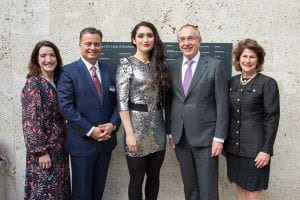
Unveiling the Donor Wall: (l to r) Angharad Milenkovic, Director of Development; alumnus and donor George Farha; artist Sarah Fortais; President & Provost Michael Arthur; Vice-Provost (International) Nicola Brewer
Guests included UCL alumnus George Farha, whose name will be familiar to all of us thanks to his outstanding and very diverse support of UCL, which ranges from funding the George Farha Café to supporting scholarships and posts in areas including women’s health, social justice and the built environment.
Recalling his student days, he commented that UCL is “a lot bigger and quite a bit shinier” than in his day, adding that “the thing that has remained the same is UCL’s commitment to its radical roots.”
The event was also an opportunity to update guests on the progress of the It’s All Academic Campaign, to which they have contributed significantly. The Campaign total now stands at £525 million and is set to reach its target of £600 million in 2020 – one year ahead of schedule.
These huge sums of money are hard to visualise but what we can see very clearly is the tangible impact they are having. Thanks to philanthropy, hundreds of students have received life- changing opportunities through scholarships. A major new home for our neuroscience research bringing is rising up on Grays Inn Road, bringing UCL’s Queen Square Institute of Neurology and the hub of the UK Dementia Research Institute together under one roof.

Nick Ross marks the Donor Wall unveiling on behalf of the Jill Dando Fund, which supports the UCL Jill Dando Institute
Generous donations have catalysed the creation of institutes and research programmes which harness UCL’s multidisciplinary excellence to lead the way in artificial intelligence, mental health, mission-oriented economics, early years education, and much more.
The success of the Campaign, and the breadth and diversity of Circle of Benefactors members, is a great tribute to Lori Houlihan, Vice-Provost (Advancement). Under her leadership, UCL has grown to become one of the UK’s highest performing fundraising universities and this Campaign has broadened and globalised our supporter base significantly.
Unfortunately, due to ill health, Lori couldn’t be at last Thursday’s event to see the fruits of her astute and creative leadership. I was privileged to step in on her behalf. While she is recovering, she has asked me to look after OVPA and I am happy to be working with her brilliant team in the interim.
I know that Lori would want me to thank the whole UCL community, whose support has been vital to making the Campaign the great success it is. The Donor Wall provides a highly visible testament to how far UCL has come in establishing fundraising as a university-wide endeavour and a crucial enabler of our academic mission.
How UCL’s Grand Challenges programme is connecting researchers with the UN’s Sustainable Development Goals
By uccg04p, on 22 May 2019
Since 2009, the UCL Grand Challenges has set out to inspire, enable and support cross-disciplinary research, and research-related activities through teaching and public engagement. The programme works to facilitate new connections between researchers across the university, and support partnerships beyond it, including with other institutions, in industry and in the voluntary sector, including community groups. Grand Challenges was born of a belief that our university has a responsibility to address the biggest challenges facing humanity, and also the expertise to make a holistic, positive contribution to complex problems.
This year, Grand Challenges is focusing on the ways in which our cross-disciplinary research can address the objectives laid out in the United Nation’s Sustainable Development Goals (SDGs). Through this, we aim to support the UCL community in developing cross-disciplinary responses to the challenges set out by the SDGs.
What are the UN Sustainable Development Goals?
The UN identified 17 goals in the 2030 Agenda for Sustainable Development, and the steps countries need to make towards eradicating poverty, tackling inequality, protecting the planet and delivering a just, peaceful society. By aligning the work of UCL Grand Challenges with the SDGs we are able to harness UCL’s expertise to contribute to the global conversation, and facilitate new partnerships, both within the university and beyond it. Over the past ten years, we have seen some truly inspiring research as a result of the partnerships fostered through UCL Grand Challenges, and we hope that by focusing on these themes, we will help to grow and develop UCL’s contribution to tackling global problems. We are also working with UCL’s Global Engagement Office, to ensure that the Grand Challenges and UCL’s Global Strategy work together to maximum effect. We must be more than the sum of our parts!
What we’ve done so far
Grand Challenges was conceived as a mechanism to help break down barriers to cross-disciplinary collaboration, support new partnerships, networks and projects, and bring academics together to share their expertise and find new solutions to complex problems. Among the projects we’ve supported are the Global Disability Hub, based at Here East, which seeks to pioneer new technologies and innovations for a more inclusive world. The Global Disability Hub has grown from a series of networking events and hackathons into an exciting new partnership involving academics from UCL, Loughborough University, and the University of the Arts London to focus on how technology and innovation can be more responsive and inclusive for the one billion people with disabilities across the world.
Through a Small Grant, the UCL Legal Advice Clinic was established, to partner UCL Laws students with a GP practice in East London, to enable people on low incomes to access legal advice and widen access to justice. The clinic has helped people through welfare benefits tribunals, provided housing advice and supported vulnerable people who would not have been able to access legal support. It also helps students gain valuable experience of casework and insight into professional practice, and strengthens UCL’s connection to our local community.
More examples of what the UCL community is doing with Grand Challenges can be found in our blog, and on the website.
How can you get involved?
The 2019-20 Small Grants Call has just opened; awards of up to £7,500 are available to support cross-disciplinary collaborations that develop new ideas and deliver impact for public benefit. We support collaborations across faculties, and also between researchers and professional services staff, and we also encourage collaboration with partners outside UCL, including local authorities, community groups and charitable organisations.
The application form encourages you to consider your proposed project in relation to the SDGs and their targets. You can read more about how to apply, who is eligible, the projects we fund on our website, and sign up for the Newsletter.
How philanthropy helps support our health and life sciences ambitions
By rmhzdal, on 8 May 2019

What we do here at UCL matters enormously.
We provide society’s best chance of tackling some of the most pressing issues of our times. We change students’ lives and improve their life chances. As a university, we aim to be a force for public good and have a positive impact on people, lives and communities.
All of this is worth paying for.
I fully support calls for greater public investment and secure funding streams for the transformative work that we do. However, the environment in which we strive to fulfill our multiple ambitions has become increasingly complex as successive governments reduce levels of core funding while introducing more rigorous performance measurement and accountability. Increased competition, shifts in demand, changes in student numbers and behaviours, as well as the potentially transformational impact of technology and innovation have also affected our operating environment. These challenges have been further exacerbated by the abiding uncertainty regarding the impact of Brexit.
The support of universities by individuals and organisations is not new. Philanthropy has an illustrious tradition in the UK and education has been a significant beneficiary since the Middle Ages. UCL was founded by philanthropy and it remains an important part of our funding mix, and one that makes a unique contribution to what we can achieve.
In September 2016, UCL publicly launched It’s All Academic – a major philanthropy and engagement campaign to raise £600m and generate 250,000 volunteering hours for UCL. It is focused on four key themes, reflecting areas in which UCL is genuinely world-leading and is making a unique impact – health, London, students and disruptive thinking. The key projects include research into dementia and other neurodegenerative diseases, cancer, eye health, and economics and public policy, capital projects including a new neuroscience building, UCL East, a new building for vision and the new Student Centre, and student support such as scholarships.
I’m delighted that health is one of the four major themes of the fundraising Campaign and continues to be the strongest in regards to funds raised. As of the end of January 2019, the theme has raised £369M (cumulative since August 2011).
In addition to the scale of the campaign, I have been impressed by its strategic sophistication and professionalism. The Office of the Vice Provost (Health) and the SLMS Senior Executive Group works closely with the Office of the Vice-Provost Advancement (OVPA) to ensure an integrated approach to fundraising planning and activity. The Deans and I are personally involved in the actual fund-raising initiatives. Importantly, we are not using donations to fill in budget holes but to transform SLMS in order to deliver our ambitions for real world impact.
Some key successes

A hub for the UK Dementia Research Institute and a new home for the UCL Queen Square Institute of Neurology.
Significant gifts totalling over £38m have been raised for a new neuroscience facility on Gray’s Inn Road to host the central hub of UK Dementia Research Institute (UK DRI) and the Queen Square Institute of Neurology. These include: £5M from a UK Foundation, a £3M gift from a Hong Kong based Alumna and £2M from the Wolfson Foundation. Our aim is to create a world-class facility to find effective treatments for dementia and neurological diseases such as: Multiple Sclerosis, Huntington’s Disease, Parkinson’s Disease, Motor Neurone Disease, Stroke and Epilepsy.
Notable gifts for Cancer include £1.87M from a grateful patient donor to support prostate cancer research, £660k from the John Black Charitable Trust to support the MINIMA minimal cancer magnetic therapy Magnetic Resonance Imaging (MRI) project led by Professor Mark Lythgoe in the Centre for Advanced Biomedical Engineering (CABI), and a recently awarded gift of £763k from the JP Moulton Foundation to support a clinical trial in prostate cancer led by Professor Mark Emberton.
SLMS colleagues are also working closely with OVPA on a number of emerging fundraising priorities:
- The Institute of Global Health Leadership aims to improve the efficiency, safety and quality of emerging health care systems.
- A potential fundraising partnership between UCL and the Zoological Society of London could drive forward the ‘one health’ approach linking human, wildlife and domestic animal health.
- OVPA have recently commissioned a fundraising feasibility study for Oriel, to test the philanthropic appeal of our ophthalmology research. Our plan is to build a brand new centre for world-class eye care, leading-edge research and professional training to address the growing burden of eye disease in an increasingly ageing population. The study will help inform our fundraising strategy and support of the UCL Institute of Ophthalmology more widely.
We have also historically benefited from other philanthropic support:
- The Pears Foundation donated £5million towards a new building at the Royal Free which will house the UCL Institute of Immunity and Transplantation (IIT);

The Pears Building will combine NHS patient care with the latest developments in research to provide better treatments for diseases such as cancer, diabetes, HIV and tuberculosis, as well as for traditional and tissue-developed transplants.
- The cost of the Zayed Centre for Research into Rare Disease in Children was met by a combination of fundraising led by Great Ormond Street Hospital Children’s Charity, £10m of funding from the Research England UK Research Partnership Investment Fund(UKRPIF) and a gift of £60m from Her Highness Sheikha Fatima bint Mubarak; and

The Zayed Centre for Research is a world-leading centre of excellence that will enable scientists and clinicians to more accurately diagnose, treat and cure young people with rare diseases.
- The Paul O’Gorman building which houses the UCL Cancer Institute was established through the help of Children with Cancer UK.
Philanthropy is not core funding but it helps us to add excellence to the core, and amplifies and expands what we do. Importantly, it acts as a catalyst to leverage further funding. For example, the combined philanthropic match of £102m for the IIT, Zayed Centre and Queen Square secured £51m from the UK Research Partnership Investment Fund. It increases the profile and influence of a particular project or area of work, brings together people and institutions in new ways, nurtures novel early-stage research and takes it through proof of concept to the point at which funding councils, the NHS, business and industry and other partners have the confidence to invest.
Philanthropic giving in the UK has a healthy trajectory. For 2017-18, giving to UK universities was up 11 percent (£979m to £1.08bn. This reflects both a growing awareness that universities are fundraising organisations and the increasing professionalism of university fundraising.
At the end of 2018, the UCL campaign had raised over £485m and had generated 160,000 volunteering hours. UCL is one of the UK’s highest achieving fundraising universities, usually ranked third in the UK for the level of fundraising income secured, behind Oxford and Cambridge.
Later this month UCL will unveil its new Donor Wall on the Wilkins terrace, which will for the first time recognise donations of over £1m to UCL. Look out for this innovative piece or art designed by a Slade Student – a fitting celebration of philanthropy at UCL.
It is clear that philanthropic giving represents an absolutely vital income stream for SLMS, the university and the health sector as a whole. I look forward to seeing us build on this success.
UCL Education Strategy: where have we got to and where are we headed?
By ucypasm, on 1 May 2019
It is now three years since we launched the Education Strategy 2016-21. The strategy is underpinned by the belief that during their time at UCL our students should experience directly the world-class research of academics and researchers so that they too understand the uncertainty at the boundaries of knowledge, become knowledge creators themselves, and build the skills they need to excel in their future careers.
Half way through, now is a good point to take stock of what has been achieved and look at what lies ahead for the next two years.
Personalising student support
We have improved how we help new students to settle in and organise their first few weeks. In its first year of operation, the Welcome to UCL app, with checklists for every stage of arrival and details of more than 1405 induction events, was downloaded more than 15,000 times and used by more than 70% of students Our personal tutoring handbooks and digital resources explain the purpose and function of personal tutoring to students and staff, helping them to get the most out of their meetings.
Further work to support the transition to UCL life is underway. The Transition Programme, where small groups of first-year undergraduate students are mentored on all aspects of university life by second years, is being reviewed to create more structured guidance for mentors, with a focus on how to get the most out of lectures and seminars, and how to use assessment and feedback effectively. This autumn we will be piloting our Introductory Programme, a new on-line programme that introduces offer-holders to UCL’s interdisciplinary approach and to new ways of thinking and enables them to explore our campus and connect with other students before they arrive.
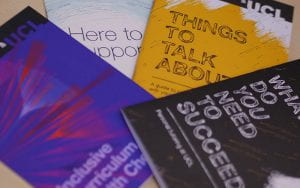 And we are improving the way we support our students once they are here. We’ll be launching the Academic Communication Centre (ACC) in September 2019. The ACC will work directly with students to support their academic writing, and support programme leads to integrate academic writing into the taught curriculum. Later this month we are producing a comprehensive Module Catalogue, a significant step towards a much more positive experience of module choice and registration for students and staff alike. This has been made possible by improvements to our student records system – the result of intense prolonged collaboration between Academic Services and departments.
And we are improving the way we support our students once they are here. We’ll be launching the Academic Communication Centre (ACC) in September 2019. The ACC will work directly with students to support their academic writing, and support programme leads to integrate academic writing into the taught curriculum. Later this month we are producing a comprehensive Module Catalogue, a significant step towards a much more positive experience of module choice and registration for students and staff alike. This has been made possible by improvements to our student records system – the result of intense prolonged collaboration between Academic Services and departments.
Our new Student Success Platform will join up the support we offer to our students: askUCL, a new enquiry management system where staff and students can raise and track enquiries, streamlining referral processes; and a personal tutoring support system that enables staff and students to manage their interactions, arranging and logging meetings and making referrals for specific support. Our new Student Health and Wellbeing Strategy aims to embed a university-wide approach to health and wellbeing so that our students can be successful and enjoy their time at UCL.
We want every student to achieve their full potential so we are working hard to make education at UCL inclusive. Departmental colleagues have been using the Inclusive Curriculum Health Check to identify areas where their programmes and programme delivery could be made more inclusive. And through our BME Attainment Project, we are recruiting and training students to act as consultants to work with staff to develop their curricula with broader representation of thought and approaches, beyond the traditional euro-centric western canon.
Putting research and enquiry at the heart of learning
We introduced the Connected Curriculum, UCL’s framework for integrating a research-based education into all our taught programmes. It is a tool to prompt discussion about curricula to ensure our students get the most from what UCL has to offer. In 2017-18, our departments benchmarked their programmes to find out the extent to which they reflected these dimensions. There is a growing bank of case studies on the UCL Teaching and Learning Portal that showcase the ways in which colleagues are developing the different dimensions of the Connected Curriculum into their modules and programmes.
 There’s been an acceleration in the award of HEA Fellowships, thanks to the work of the Arena Centre for Research-based Education, and earlier this year Anil Doshi from the School of Management was the 1,000th UCL colleague to achieve Fellowship through the Arena Programme. But professional development doesn’t stop there. Every year more than 400 staff attend UCL Education Conference, for a programme packed with presentations by colleagues sharing their innovative practice and research.
There’s been an acceleration in the award of HEA Fellowships, thanks to the work of the Arena Centre for Research-based Education, and earlier this year Anil Doshi from the School of Management was the 1,000th UCL colleague to achieve Fellowship through the Arena Programme. But professional development doesn’t stop there. Every year more than 400 staff attend UCL Education Conference, for a programme packed with presentations by colleagues sharing their innovative practice and research.
Improving assessment and feedback
Our students continue to tell us that the way we are supporting their learning and evaluating their progress needs to get better. There is no silver bullet here and we have been tackling this problem through a number of different initiatives. To ensure fairness and maintain academic standards, we have introduced a single set of academic regulations for all taught programmes, with more supportive progression regulations and clear classification regulations and algorithms. The new regulations support staff to develop and make use of a variety of forms of assessment – we know that diversity in assessment is vital for inclusion. Our Assessment Review continues, and UCL Arena Centre will soon start to work with departments to audit their assessments, using a methodology known as TESTA which has had proven impact elsewhere in the sector. We have also developed more print and online resources to help our students make the most of their assessment and feedback, as well as drawing their attention to processes such as Extenuating Circumstances and Condonement.
 The experience for our students has been improved by the move to a single modern facility at ExcelLondon. Thanks to system and process improvements, the Exam Timetable now has an earlier publication date in February and we have rolled out Late Summer Assessments across the university, so that our students can take deferred exams or resits without having to wait until the following year.
The experience for our students has been improved by the move to a single modern facility at ExcelLondon. Thanks to system and process improvements, the Exam Timetable now has an earlier publication date in February and we have rolled out Late Summer Assessments across the university, so that our students can take deferred exams or resits without having to wait until the following year.
Developing student engagement and leadership
So that we can gather feedback from our students, we have overhauled the student survey cycle, introducing PTES, New to UCL and Student Experience Survey (for penultimate year undergraduates), and dropping the Student Barometer. We are now working on making the results of these surveys accessible through Tableau, so that staff can delve into the data and work out priority areas for improvement. In the three years since its launch, our Student Experience Panel has grown to 1100 active participants, providing another way of gathering student perspectives and feedback on issues outside of their programmes.
UCL ChangeMakers, our scheme that brings students and staff together to work on projects to enhance education within departments, is being scaled up to give students the opportunity to collaborate on projects of institution-wide impact.
Our current Student Voice project is reviewing how student voices shape our decision making and how we can make students more active participants in the process of improvement. Currently there are many different ways in which students are asked to evaluate the modules they have studied. We are scoping a Module Evaluation Platform with a view to harmonise module evaluation across the university, to improve the experience for our students and to provide more useful data and insight.
Preparing students for the workplace and the world
 We have introduced annual careers registration for all undergraduate and postgraduate taught students In the first year, 96% of new and returning students completed careers registration, giving us extremely valuable data, so that we can provide targeted support, reaching those students who would benefit from intensive careers advice at a much earlier stage. So that UCL Careers can give effective support to recent graduates and enhance graduate outcomes, an Exit Survey for graduating students is being developed. In particular, the data will enable us to identify which students are at risk of leaving without having secured their next opportunity.
We have introduced annual careers registration for all undergraduate and postgraduate taught students In the first year, 96% of new and returning students completed careers registration, giving us extremely valuable data, so that we can provide targeted support, reaching those students who would benefit from intensive careers advice at a much earlier stage. So that UCL Careers can give effective support to recent graduates and enhance graduate outcomes, an Exit Survey for graduating students is being developed. In particular, the data will enable us to identify which students are at risk of leaving without having secured their next opportunity.
Our Global Internships Programme encourages UCL students to undertake an international summer internship during their time at university, offering internship opportunities, funding and advice on working overseas.
Enriching digital learning
We have invested £2.5m in audio visual facilities across the campus and continue to enable Lecturecast across our teaching estate. Early adopters of Reflect, our blogging platform for staff and students, are enthusiastic about its potential to enhance teaching and learning.
We keep how we want to teach and learn under constant review so that we can continue to design an online environment to support changing pedagogic and social approaches as well as taking advantage of rapidly advancing technology. We will work closely with academic colleagues to meet increasing demand for good online content to support digital learning. And compliance with new accessibility legislation will ensure that all content on our digital estate is inclusive.
Creating a teaching estate to meet our needs
When we launched the Education Strategy in 2016 there was an acute shortage of teaching and learning spaces that was seriously diminishing the experience for students and staff alike. Three years on there is still much to do but much has been achieved. In 2016-17 alone, we increased the number of study spaces by 15% and through Transforming UCL increased teaching seat capacity by 23%, as well as refurbishing significant buildings such as Bentham House, home to the Faculty of Laws, and creating Wilkins Terrace, a new outdoor social space at the heart of the Bloomsbury Campus.
We have made operational improvements to the timetable and introduced a system that tells students where they can find free study spaces. There is still more work to be done on timetabling but it is possible to see how improved module choice with the new module catalogue, earlier module registration, better systems and higher quality management information will enable us to make much-needed further progress in the medium term.
 A personal highlight has been the recent opening of the Student Centre. Five years in planning and build, this was conceived in partnership with our students and reflects our commitment not only to them, but also to world-class architecture, construction and sustainability. Being really high quality and with students at its heart, it is the physical embodiment of everything that we have been seeking to achieve through the Education Strategy.
A personal highlight has been the recent opening of the Student Centre. Five years in planning and build, this was conceived in partnership with our students and reflects our commitment not only to them, but also to world-class architecture, construction and sustainability. Being really high quality and with students at its heart, it is the physical embodiment of everything that we have been seeking to achieve through the Education Strategy.
Evolving the culture
We have been working hard to raise the status of education at UCL, to secure parity of esteem for the work of our educators and those who support them. In 2018 we introduced the Academic Career Framework, which enables recognition and reward for teaching activity and encourages innovation and education leadership.
So as we enter the next phase of the Education Strategy, thank you to everyone who has helped to get us this far. We are making great progress. The many initiatives to improve and develop our practice, processes, systems and facilities will all help in this next phase, but most of all it will be your continuing dedication to our students that will make the crucial difference. And for that I thank you very much indeed.
Strengthening our global impact
By ucypnmb, on 21 March 2019
By the time you read this it may be clearer (it could hardly be less clear) whether the UK is going to leave the EU on 29 March, on 22 or 23 May [i], on 30 June or possibly at some other date after European Parliament elections. As I write, it isn’t. So, a good time for some longer term thinking about how global engagement can strengthen UCL’s academic mission and impact.
I predict that in 15 years’ time, there will be around 15 to 20 world-class universities that are distinctive in being both institutionally and academically very outward looking and internationally engaged. Some of those 15-20 will want to make a global impact for good. UCL could well be one of them. If we are, it will be because we’ve built real partnerships of equivalence around the world that make it easier for new research collaborations to be co-funded, for joint appointments to be made, for student exchanges to expand, for more foreign students from a wider range of countries to want to apply to study with us, and for more co-publications which attract high citations. That would be good for our academic mission, for individual academics and for UCL’s global impact and profile.
This is unlikely to happen by chance, without sustained effort and some institutional support. Strategic global impact, built bottom up, requires long term engagement. If we can identify patterns of individual UCL academics collaborating with particular HEIs overseas, then by building some strategic support around those collaborations – for example, student exchange agreements, joint seed funding schemes, dual degrees, visible support from the Presidents of the institutions – we can increase the chances of the partnership lasting and expanding to include more people and have more impact. If a partnership is entirely dependent on only one person in each university partner, the institutional link is likely to end when their careers take them elsewhere.

Prof Marie Lall, Prof Monica Lakhanpaul and Prof Priti Parikh, the academics working on a cross-disciplinary project to improve child nutrition in India
How much does this matter? It’s particularly important to have strongly committed international partners in difficult times. In the short term, even UCL’s brilliant minds may face challenges taking the lead in European research groups. And equally, working in a university that is comfortably in the top 20 worldwide gets all of us a warmer welcome from other leading universities than if we were relying only on individual reputations. One example: over two years of academic-led (thank you Professor Marie Lall and Professor Monica Lakhanpaul, and many others) incremental increase in our engagement with India led to an outstandingly warm and constructive welcome from the academic community at the All India Institute of Medical Sciences when the Provost and 10 academic colleagues from UCL visited last month. Not once did we have to explain that ‘we aren’t from UCLA’.
What’s the point of global partnerships?
Our Global Engagement Strategy is to work with partners to achieve fair solutions to global challenges. This involves developing strategic partnerships with international partners with global reputations, with whom UCL shares interests and expertise in solving world issues. So the partnership is not an end in itself: it is an additional means to support our academic mission.
Those strategic partnerships are being, and will continue to be, built from the ‘bottom up’, through existing academic collaboration. Alongside six ‘Type 3’ cross-institutional partnerships (the University of Hong Kong, the Max Planck Society, Osaka University, Université PSL, the University of Toronto and Yale University), we announced Peking University as our first ‘anchor partner,’ last year.
The University of Toronto is likely to become our next anchor partner, thanks to strong Faculty engagement in areas including child health, brain sciences, cities and education; plus strong commitment at a senior level, a successful joint funding scheme and a number of reciprocal visits – the next by the Provost in early April.
And we have a pipeline of 17 Faculty-led partnerships with the potential to become cross-institutional partners involving more Faculties.
Cities partnerships Programme
Initial doubts from some colleagues about a new initiative as part of the Global Engagement Strategy, designed to counteract the Brexit effect, called the Cities partnerships Programme, turned to enthusiasm after some changes before the programme began. Encouraging numbers of UCL staff applied for small grants to support academic collaborations in Rome over the next three years. The first 30 projects, all being curated by Dr Florian Mussgnug (SELCS) as Academic Director, have been allocated funding and more will follow. The next cycle of projects will be in Paris, led by Dr Claire Colomb from the Bartlett. I am confident that UCL’s profile and impact in both cities will rise as a result, especially in France which Collette Lux’s Communications and Marketing team have identified as one of three priority markets to increase brand awareness of UCL.
The Cities partnerships Programme offers seed funding over the three years it will run in each city. Every Faculty is receiving funding and projects will be led by senior academics and early career colleagues. Applications for the next round of funding have just opened so if you’re looking for support for a project designed with partners in Rome or Paris, please do apply.
A small set of strategic partnerships and the Cities partnerships Programme are just two of the priority activities to deliver UCL’s Global Engagement Strategy 2015-2020 launched four years ago after wide consultation, and shortly to be reviewed to see if we should change or extend it for a further five years.
We’ll be doing this review over the next 18 months. We gave it a ‘soft launch’ at the Leadership Forum on 5 March, and collected 64 responses to questions about what colleagues do and don’t like about the current Global Engagement Strategy. We’re still analysing the results but one early finding is that there is particularly strong support for how the Strategy promotes UCL internationally.
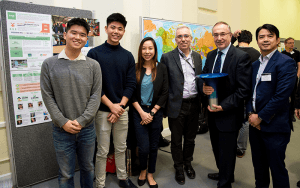
The student entrepreneurs behind Rice Inc, a social enterprise aiming to alleviate food poverty in Southeast Asia, which won the 2018 $1m Hult prize
We celebrated some of that international promotion last month. Over 160 academic and professional services staff joined the annual ‘Celebrating Global Engagement Event’ on 7 February. Students who had achieved notable international success in 2018 also came, including the winners of the 2018 $1 million Hult Prize. Many of the recent Global Engagement Funds recipients were there to share their success stories of how small amounts of UCL seed funding can help shape the direction of research and secure additional external funding.
In total so far, we’ve awarded £760,000 of grants to UCL academics who have gone on to generate £13.4 million of external funding – evidence that UCL seed-funds accelerate or catalyse the process of discovery and knowledge sharing.
Over the past three years, those Global Engagement Funds have supported 550 UCL academics to partner with over 460 organisations in 79 countries. Small grants of up to £2,000 from the fund are encouraging even more visits, journal co-publications and workshops. Applications for the latest round have just opened.
Institution-wide support and staff changes
All this global engagement activity relies on internal as well as external partnership, between academics and professional services colleagues across UCL. Implementing the Global Engagement Strategy is an institution-wide effort.
We have just appointed, or in some cases reappointed, new Regional Pro Vice Provosts and some new Vice Deans International have been appointed by Faculties. Professor Alejandro Madrigal stepped down as Regional Pro Vice Provost for Latin America but will now act as Country Ambassador for Mexico, as Professor Shin-Ichi Ohnuma does for Japan. Dr Karen Edge returned full time to the IOE at the end of February and Professor Dame Hazel Genn (former Dean of the Faculty of Laws) will take up the post of Pro Vice Provost International in April. She will be succeeded in 2020 by Professor Deenan Pillay, currently seconded from UCL as Director of the Africa Health Research Institute based in South Africa.
Staying globally engaged – and a new discovery in Qatar
A lot has changed since we developed the Global Engagement Strategy through consultation in 2014. Despite the examples of impact we can start to show the Global Engagement Strategy is having, there‘s no denying that we are in a much tougher geopolitical context than five years ago. UCL can’t change the global political realities, at least, not in the short term! But I believe that staying globally engaged and creating respectful partnerships of equivalence must be part of the answer. UCL needs to champion and support global citizens in our community and through our partnerships.
I’d like to share a recent example of how UCL is putting its knowledge and expertise to work in the field. In a monumental discovery earlier this month, a team led by Dr Jose Carvajal Lopez of UCL Qatar uncovered Qatar’s earliest Islamic period settlement.

The team of researchers, led by Dr José Carvajal López of UCL Qatar, at the spot where they unearthed the earliest Islamic period site in Qatar
As Dr Lopez said: “While this truly remarkable heritage belongs to the history of Qatar and of the Gulf, its significance goes beyond that of national and regional interests, because it can potentially change our perception of the early history of Muslims.”
That’s just one aspect of the academic excellence of UCL Qatar staff and students. To help illustrate this and to support their work, including the successful completion of UCL’s contract in Doha at the end of 2020, we have put together an infographic of their key achievements since 2010.
These are just some of the ways that UCL is having impact around the world. Please sign up to UCL Global News for many more examples. UCL’s academic mission starts at home but we want to make a difference globally. By 2034, I predict we’ll be one of those 15 or 20 leading universities that are widely recognised for doing exactly that.
[i] Following a request by Prime Minister Theresa May, the European Council (Article 50) agreed on Thursday 21 March to extend the UK’s departure date to 22 May 2019, provided the Withdrawal Agreement is approved by the House of Commons by 29 March 2019 at the latest. If the Withdrawal Agreement is not approved by the House of Commons by then, the European Council has agreed to an extension until 12 April 2019.
Why engage in innovation and enterprise at UCL?
By ucypcac, on 26 February 2019

Dr Celia Caulcott, Vice-Provost (Enterprise)
For me, one of the most exciting aspects of working at UCL is being surrounded by so many brilliant minds with such an abundance of original ideas – and then seeing people realise the potential of those ideas and take them out into the wider world for the benefit of society.
There are many ways to achieve this, including partnering with charities or businesses; developing short courses for professionals and organisations; providing consultancy to industry, government and policy-makers; and commercialising discoveries.
Importantly, these activities, which UCL Innovation & Enterprise facilitates, bring tremendous benefits to academics and their research and teaching work. They can enhance and expand existing research projects, facilitating access to data and helping to frame new questions in a way that would be difficult in a purely academic context. They also help build personal and professional reputation and extend networks, introducing new people who can bring fresh perspectives to research and teaching. In some cases, innovation and enterprise can generate additional personal and institutional income too.
Occasionally, I speak with colleagues who struggle to see how innovation and enterprise are relevant to their particular areas; but I firmly believe there remains a wealth of untapped potential across all areas of UCL to help drive positive change.
In this piece, I’d like to illustrate some projects that attest to the sheer diversity of impact we already have – which might challenge some existing notions around innovation and enterprise and even provide some inspiration.
Enhancing research
You may have recently seen some powerful advertisements across the tube and transport network, as part of Holland & Barrett’s ‘Me.No.Pause’ campaign – profiling a diverse group of women going through the menopause.
The campaign was in response to research led by Professor Jessica Ringrose (Institute of Education) commissioned by the Greater London Authority (GLA), showing less than half (48%) of Londoners feel that ads adequately reflected the capital’s diversity. The ‘Me.No.Pause’ campaign is running for 12 weeks, and is bound to start a fresh debate about diversity and advertising. For Jessica it was an exciting addition to her existing research around digital feminist activism and involved adopting some new research methodologies. She is now exploring a multitude of partnership opportunities that have resulted from the campaign.
 Another example of external partnerships enhancing research comes from the lab of Professor Brad Love, who was approached about using Tesco’s loyalty card data to better understand why customers switch products. Human decision making of this kind is well understood in the lab environment. But analysis of Tesco’s real-world dataset of 280,000 anonymized individuals revealed some surprising findings, going against established thinking – for example suggesting that the very act of purchasing can make novel products more desirable. The project not only helped Tesco better understand consumer behaviour, it also led to a paper in Nature Human Behaviour and funded a PhD studentship.
Another example of external partnerships enhancing research comes from the lab of Professor Brad Love, who was approached about using Tesco’s loyalty card data to better understand why customers switch products. Human decision making of this kind is well understood in the lab environment. But analysis of Tesco’s real-world dataset of 280,000 anonymized individuals revealed some surprising findings, going against established thinking – for example suggesting that the very act of purchasing can make novel products more desirable. The project not only helped Tesco better understand consumer behaviour, it also led to a paper in Nature Human Behaviour and funded a PhD studentship.
Transforming practices
Innovation and enterprise can have a profound impact on practices and processes in a variety of professional sectors.
UCL’s Integrated Legal Advice Clinic (UCL iLAC) takes a holistic approach to legal problems, acknowledging that they tend to cascade into other areas of life. Since 2016, over 75 students have worked with the centre’s solicitors and advisers, providing pro bono support to over 200 clients – for example in tribunals to secure benefits or overturn pending evictions.
Another example of transforming practice comes from Dr Parama Chaudhury and her colleagues from the Department of Economics and Centre for Teaching and Learning Economics. They are delivering specialist training to diplomats around the world, who work out of the UK’s Foreign and Commonwealth Office (FCO). The training covers labour markets, exchange rates, financial and macroeconomic crises and regulation, amongst other economics topics, and could ultimately have a far reaching impact on local economies around the world as well as global policymaking.
Both these examples also point to the great benefit innovation activities have in extending networks, meeting new people and gaining different perspectives. Students from the Legal Advice Clinic go on to work in various fields of law, but retain and apply that sense of social justice and perspective inspired by their often disadvantaged former clients. Meanwhile, Parama and her team are afforded an insight into the challenges of applying economic theory in a turbulent political climate.
It’s important that we see the world from other people’s vantage points.
Collaborate to innovate
I would argue that addressing Grand Challenges such as Global Health, Sustainable Cities and Cultural Understanding needs not only UCL collaboration across different academic disciplines, as already happens, but also collaboration with users – businesses and industry, governments and the public.
One prolific collaborator at UCL is Dr Kenneth Tong (Department of Electronic and Electrical Engineering) – who has pioneered many new developments in the telecommunications industry. More recently, Kenneth realised that his technologies could have a transformative impact on global food production, through monitoring localised weather patterns, soil conditions and crop quality – ultimately to increase the efficiency of harvests and maximize crop yields. To bring this vision to life, Kenneth is now collaborating with colleagues across UCL as well as externally with Rothamsted Research.

Studio Wayne McGregor, dancer Catarina Carvalho. Photo by Ravi Deepres
Collaboration also flourishes at the interface between arts and sciences – two sectors that can learn much from each other. The growing UCL Dance Network partners UCL academics and students with organisations including the English National Ballet (ENB), Sadler’s Wells, Studio Wayne McGregor and The Place. Current projects include exploring the potential benefits of dance in Parkinson’s disease and new digital approaches to choreography. Dr Robert Thompson (Department of Electronic and Electrical Engineering) spent three months as an Innovator-in-Residence at the ENB, and shared some insights:
“Unless you open yourself to the idea of engaging with different audiences, you’re never going to be inspired as to where your work can have further impact. All the pre-existing ideas I had for collaboration had totally changed.”
Help at hand
As Vice-Provost (Enterprise), more than anything, I want to encourage and champion a culture of innovation and enterprise across UCL. All of the areas highlighted in this piece have received some combination of guidance, support and funding from UCL Innovation & Enterprise. Of course, innovation also happens independently at the individual, research group, department and faculty level; but we are always here to provide advice to make sure that academic benefits are realised. With all the capabilities that UCL needs to support this agenda now sitting as one under UCL Innovation & Enterprise, it’s never been easier to get involved and make these activities integral to teaching and research at UCL.
Challenges and opportunities ahead
Capturing the sheer breadth of innovative activity that takes place at UCL – and other institutions in the UK – will be a key aim of the new Knowledge Exchange Framework (KEF). It aims to assess, quantify, understand and ultimately improve all the many ways in which we interact with the wider world. It will sit alongside the Research Excellence Framework (REF) and Teaching Excellence Framework (TEF) in assessing the three core activities in the higher education sector. Indeed, the KEF is very much at the heart of the Government’s Industrial Strategy: Building a Britain fit for the future.
These are challenging times, and the uncertainty that has marked the wider political and socio-economic landscape over the past few years shows little sign of abating. But what we do know is that the UK, along with much of Europe, will continue moving towards a knowledge-led society and economy in which universities can and should play an increasingly important role.
The radical thinking and innovative culture that is part of the very fabric and history of UCL provides us with the ideal platform to respond to the challenges ahead. There’s a tremendous opportunity here for us to re-shape our society and economy, into one that is healthier, happier, more equitable, productive and resilient. It’s never been more important for us to engage externally to achieve this.
Find out more about how your work can benefit from UCL Innovation & Enterprise and the services we offer: https://www.ucl.ac.uk/enterprise/staff
Finding new ways to improve human health
By rmhzdal, on 30 January 2019

Professor David Lomas
As a university we endeavour to be a force for public good and have a positive impact on people, lives and communities.
The growing burden of disease in an increasingly ageing population is putting intense pressure on health and care services. We must strive to use health life sciences to change the way we think about health and disease and how best to manage them. Through ‘translation’ we aim to transform scientific discoveries arising from laboratory, clinical or population studies into new clinical tools and applications that improve human health.
Increases in interdisciplinary research, NHS and industry collaboration, and the adoption of innovative treatments and technologies will all be key components of successfully applying biology and technology to health improvement and advancing the development of new approaches to disease.
Interdisciplinary Research
UCL’s strength in life and medical sciences is driven via the School of Life and Medical Sciences (SLMS). However, the scale and scope of our work in health extends to many other non-biomedical disciplines: spatial sciences, engineering, laws, mathematics, pedagogy, and physical sciences, as well as arts, humanities and social and historical sciences. These combine to address structural, environmental, and cultural determinants of health, and deliver health and healthcare innovation.
NHS and industry collaboration
We work closely with our NHS partners (University College Hospital, Royal Free Hospital, Whittington Hospital, Eastman Dental Hospital, Great Ormond Street Hospital, Moorfields Eye Hospital, the National Hospital for Neurology and Neurosurgery, Royal National Throat, Nose and Ear Hospital and Royal National Orthopaedic Hospital) to redefine what can be achieved through academic and clinical partnership.

Oriel | Proposed view from St Pancras Way (c) AECOM / Penoyre & Prasad / White Arkitekter
These partnerships have led to the development of exciting joint initiatives, success with joint research and capital bids, and leveraging of philanthropic funding (e.g. Zayed Centre for Research into Rare Disease in Children, UCL Institute of Immunity and Transplantation, MRC UK Dementia Research Institute, and Oriel).
Partnership working, most explicitly articulated through our three UCL NIHR Biomedical Research Centres (BRCs), helps us to translate advances in biomedical research into real benefits for patients. The relationships with the hospitals also facilitates investigators actively involving patients and the public in their research. This public engagement in research can lead to treatments that better meet the needs of users and the public, and research outcomes that are more likely to be put into practice.
A key mission of the BRCs has been to develop a culture of enterprise and facilitate translation of discovery science at UCL into patient care. The partnership is critical to realising the value of discovery science, a value that grows exponentially following successful early phase clinical translation. The BRCs have invested in the Translational Research Office (TRO) which has been fundamental in bringing together the necessary expertise in design, and research management and governance of early phase trials, as well as technology transfer expertise in various disciplines. The biomedical portfolio supported by the TRO spans a total of 72 projects with a cumulative value at the end of the academic year 17/18 of >£114m, growing from £90m in 2016/17.
The group are particularly successful with helping PIs secure funding from the MRC Developmental Pathway Funding Scheme, Wellcome innovation schemes, NIHR i4i and LifeArc as well as providing a link through UCLB to the UCL Technology Fund and the Apollo Fund. For example, the UCL Technology Fund has recently invested £1m in a School of Pharmacy project to treat pancreatic cancer.
In December last year, Eisai renewed for a further 5 years our strategic alliance in neurodegeneration drug discovery as well as continuing to support the Leonard Wolfson studentship program. This is a great example of how working in partnership can accelerate translation, shortening the development timelines by many months, with the alliance recently moving their first drug candidate into the clinic.
Other Pharma relationships include Ono Pharmaceuticals (early translational projects with multiple PIs), CellMedica (novel T Cell receptor technology with Hans Stauss and Emma Morris), Grail Therapeutics (early detection of lung cancer with Sam Janes) and Astra Zeneca (access to their compound library three times/year through Richard Angel, TRO Drug Discovery Group).
Our commitment to partnership is exemplified by analysis performed over a 6 year period (2010-2016) which demonstrated that on average 30% of PIs across SLMS were working in partnership with industry.
Innovative treatments and technologies
We have recently established six Therapeutic Innovation Networks (TINs) to accelerate the development of novel therapeutics. The scheme was piloted in 2015, with the establishment of the Cell, Gene and Regenerative Therapies TIN.
UCL, working with UCLB to create spinouts and partnerships, is a world leader in the clinical translation of cell, gene and regenerative therapies. The strength and depth of activity has resulted in a number of high-profile Pharma collaborations and spin-out companies including: Orchard £392M, Autolus £251M, Freeline £123M, Miera £77M, and Achilies £13m.

B cell leukaemia Wikimedia Commons
UCL has a growing CAR T-cell programme based at the UCL Cancer Institute and Great Ormond Street Hospital. There are currently ten phase I/IIa clinical studies of experimental CAR T-cell approaches open at UCL affiliated hospitals which stem directly from this programme (the largest CAR T program in the UK). As an example of pull through from discovery science to clinical application for patient benefit, NHS England announced last year that children and young people in England with B cell leukaemia would be able to benefit from Europe’s first full access deal on CAR-T therapy.
A growing area of partnership with our hospitals, BRCs and industry spanning the whole of the academic base across UCL is in the area of “big data”. UCLH’s partnership with the Alan Turing Institute aims to use the power of data science and artificial intelligence (AI) to support clinical decision making and make services safer, quicker and more efficient. The DRIVE – Digital Research, Informatics and Virtual Environments unit being opened at Great Ormond Street Hospital will create a unique informatics hub to harness the power of the latest technologies to revolutionise clinical practice and improve patient outcomes. Meanwhile, pioneering research from Moorfields and the UCL Institute of Ophthalmology working with DeepMind Health has given a demonstration of the potential impact AI could have for patients; an AI system that recommended the correct referral decision for over 50 eye diseases with 94% accuracy, matching world-leading eye experts.
Through this commitment to interdisciplinary research, NHS and industry collaboration, and the adoption of innovative treatments and technologies, UCL is well positioned to develop further novel approaches to all types of disease and to genuinely and fundamentally improve people’s everyday life.
A life-long relationship – why and how to keep your alumni connected
By ucyolma, on 15 January 2019
UCL’s 2018 alumni survey showed that 89% of alumni who responded feel positive about the experience they had as students here and 91% describe themselves as ‘proud’ to have been a UCL student.
Notably, UCL graduates who are still in touch with other alumni are significantly more likely to say that their student experience was excellent, to be proud of UCL and to still feel connected to the university.

Cathy and Martin Lee present £3m donation to UCL
These proud, connected alumni are our biggest advocates, our volunteers and, in many cases, also our donors – as we saw in November, when Hong Kong alumna Cathy Lee and her husband Martin announced a donation of £3 million to support our neuroscience research. So keeping that strong sense of connection to UCL and their UCL network is vital.
Clearly student experience in the round plays a huge part in that and the investment UCL is making to support students to have an excellent social as well as academic experience – for example through the new Student Centre – is very important.
Keeping graduates in touch with UCL and each other
But what we do after students graduate can also make a big difference in keeping them connected to UCL and each other, and to maintaining that sense of pride and belonging.
As Vice-Provost (Advancement), alumni engagement is one of my key responsibilities. That’s why UCL’s It’s All Academic Campaign is as focused on building and growing our worldwide alumni community as it is on raising £600 million in philanthropic income.
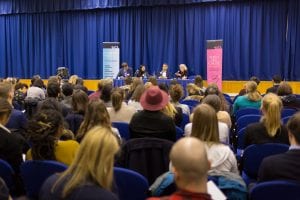
UCL alumni professional development event
Since the Campaign launch in September 2016, my office has led a wide range of alumni relations activities, from delivering a range of social and professional development events in London, the UK regions and key international markets to developing online platforms through which alumni can network, find friends and contacts, and support each other and current students.
Strongest relationship is with departments
However this isn’t and could never be the totality of our alumni engagement. The survey confirmed what we have long known – that the majority of alumni feel the strongest sense of relationship with their schools, faculties and departments.
Therefore a big part of what we do is work with departments to support, develop and facilitate their own targeted alumni engagement.
Your alumni want to stay involved and can help you tremendously, through mentoring and work experience opportunities for current students, research and business collaborations, course marketing support, advocacy, and of course philanthropy.
We know that many departments already have well-established alumni programmes in place, while others are still developing or are at an early stage. Whatever stage you are at, my office is here to help you reach and engage your alumni through a variety of methods and channels.
Opportunities to engage international alumni

Professors Hazel Genn and Geraint Rees meet Hong Kong alumni
The alumni survey also gave evidence of something that we have long been intuitively aware – that international alumni communities are some of our most active and engaged, despite having fewer opportunities to physically come back to visit UCL. Travelling abroad to study is momentous and memorable; that chance to meet people from different cultural backgrounds (often for the first time) and to live in an iconic capital city is life-shaping and forges a powerful connection.
All relationships need work and attention to keep them going, and our key international communities hugely appreciate visits from UCL staff to keep them feeling part of the community as well as our regular digital communications.

USA alumni reconnect with UCL
Through 2019, we will be working hard to nurture and build on our international alumni engagement, in particular in the key markets of China and Hong Kong, Malaysia and Singapore, Japan and the USA.
If you have plans to travel in those regions this year and might be interested in taking part in alumni events or meetings, please contact my team for more information.
University years are a memorable and, for many people, transformative time, shaping the rest of our lives. The time students spend here at UCL is comparatively short but the memories last a lifetime – and so should the relationship. Investing in keeping our alumni close reaps multiple benefits for UCL, our students and for alumni themselves.
For advice on how the alumni relations team can support you to further your alumni engagement or on how to take part in international alumni events, please contact us on alumni@ucl.ac.uk.
Why it’s important to let our students know we’re listening
By ucypasm, on 4 December 2018
Our students have many opportunities to make their voices heard, so why don’t they think we’re acting on their feedback?
Our Student Engagement team can help you tell your students how they are driving change.

At the heart of what we are doing is the idea of students as partners – a key principle that we wrote into UCL2034 and followed through in the Education Strategy 2016- 21.
This was developed through wide-reaching consultation with students as well as staff, and is predicated on working in partnership with our students towards our objectives of all students having a stretching and challenging education and a fulfilling experience to prepare them for the next stage in their careers.
What does partnership look like?
Our partnerships with students take many forms and I am proud of all the ways that have been established – at department, faculty and institution level – to enable our students to make their voices heard and create real and lasting change for them and their successors. We know that such engagement is a positive influence on the quality of their experience at UCL.
Students’ Union UCL and Student Academic Representatives: we work closely with the elected Sabbatical Officers and staff of the UCL Students’ Union. The Students’ Union trains and inspires more than 1,350 Student Academic Representatives, who work at department and faculty level to represent the opinions and ideas of their undergraduate and postgraduate classmates.
Every department has a Student Staff Consultative Committee (SSCC), where staff and student representatives meet at least termly to discuss issues raised by students and come up with solutions.
Student surveys and consultations: students are given the opportunity to reflect on many aspects of their experience of UCL at different points during their time here through our institutional surveys, New to UCL, Student Experience Survey, National Student Survey, PTES [link to Annual Survey Cycle].
Our students give more specific feedback about their academic experience through module evaluation and work is underway to buy a new system to reduce the administrative burden on departments of running these surveys.
Student Experience Panel and focus groups: students are recruited to focus groups for consultation on initiatives to make the student experience better, for example, ensuring that regulations around exams and extenuating circumstances are clear and fair, or asking students for their feedback on how UCL handles enquiries and questions about access to services.
Our thousand-strong Student Experience Panel gives feedback through surveys, workshops or user-testing on anything from the design of new print material to the key message of a campaign. Find out more about working with the Student Experience Panel or how to submit a request on the Teaching and Learning portal.
Active engagement: as ChangeMakers, Arena Student Fellows and Student Reviewers, our students collaborate with staff across the university to improve the student experience (for example, reviewing and replacing a key textbook with an alternative, more accessible option for the Psychology with Education BSc programme, establishing a dissertation ‘mixer’ event for third year students to help prepare second years on the BA Geography programme and the development of the UCL ChangeMaker Guides to Assessment and Feedback.)
Poor NSS score for Student Voice
In spite of the mechanisms that are in place, we perform poorly on the ‘Student Voice’ measure in the National Student Survey. In 2018 we scored 68%, compared with the sector average of 73%. Look more closely at the three questions that combine to create this score, and it is clear where the problem lies.
- 84% of our students agree that they have had the right opportunities to provide feedback on their course – here we are absolutely in line with the sector.
- But only 69% of our students agree that staff value students’ views and opinions about the course
- And, worryingly, only just over half our students (51%) agree with the statement ‘It is clear how students’ feedback on the course has been acted on’.
Across UCL in recent years you have made a tremendous number of positive changes. So why don’t our students think we’re listening? Perhaps because we aren’t communicating that change effectively.
This matters. First, because that’s how successful partnerships work – if you work alongside students to make change, if you consult them about the way you do things, then part of the partnership process is to tell them how they’ve made a difference.
Second, closing the loop helps you to measure the impact of the changes you’ve made – if you’ve acted on what your students are telling you and your students can see the difference, then they’ll let you know through surveys and more informal feedback.
Third, the metrics matter to our reputation. In 2020 we will make our subject-level submission to the Teaching Excellence and Student Outcomes Framework (TEF). One of the metrics that will be used to measure the quality of a UCL education will be the Student Voice metric of NSS.
How can you tell your students about change?
We have just appointed Professor Deborah Gill as UCL’s first Pro Vice-Provost (Student Experience) and engaging with students is key to her role. Early in the New Year, Professor Gill and our Head of Student Engagement, Sally Mackenzie, will be meeting with departments to understand local challenges and identify ways that my office can offer support to communicate the changes that have been driven by your students.
There are several ways to do this:
- Conduct a ‘You Shape UCL’ campaign in your department. Use the templates produced by our Student Engagement Team (Read ‘How have students shaped your department or faculty? Let them know through ‘You Shaped UCL 2018’)
- Share the work of your Student Staff Consultative Committee with your students, so that they all feel they have a stake in it (Read the new case study on UCL Teaching and Learning Portal about how revitalising UCL Geography’s Staff Student Consultative Committee resulted in a 9% rise in NSS ‘student voice’ score in one year)
- Share with all your departmental colleagues the details of those changes, so that they can act as advocates with their students.
- Hold student experience events or forums for staff and students to meet and talk about changes or key issues in the department.
Celebrate positive change
We are privileged to be able to attract such talented students to UCL and we must make the most of the opportunities to benefit from their ideas to improve the education we offer.
And finally, communicating the positive changes gives us the opportunity to thank all the students and staff who are making a difference and shaping UCL for the better.
 Close
Close



